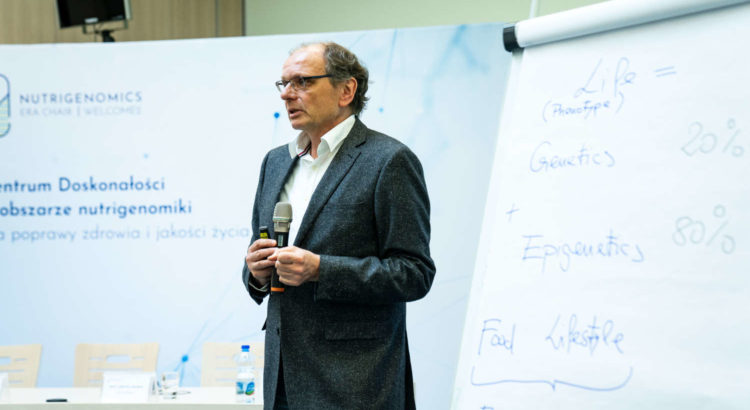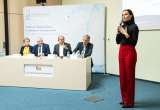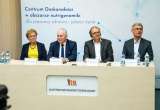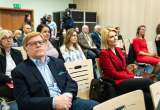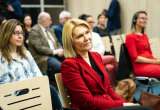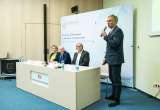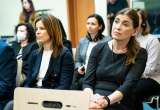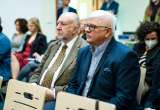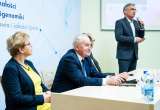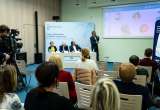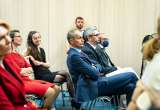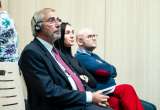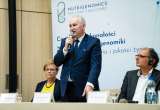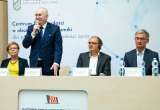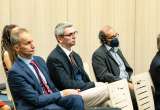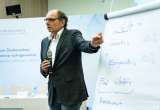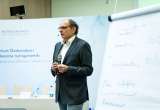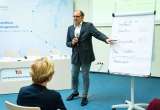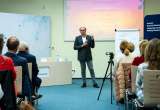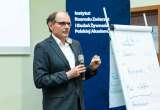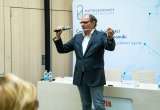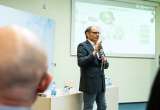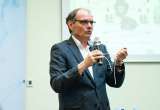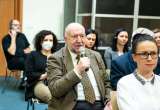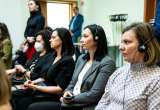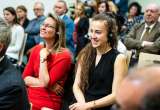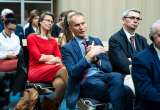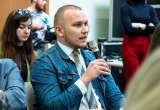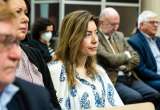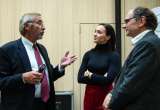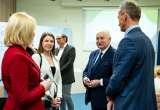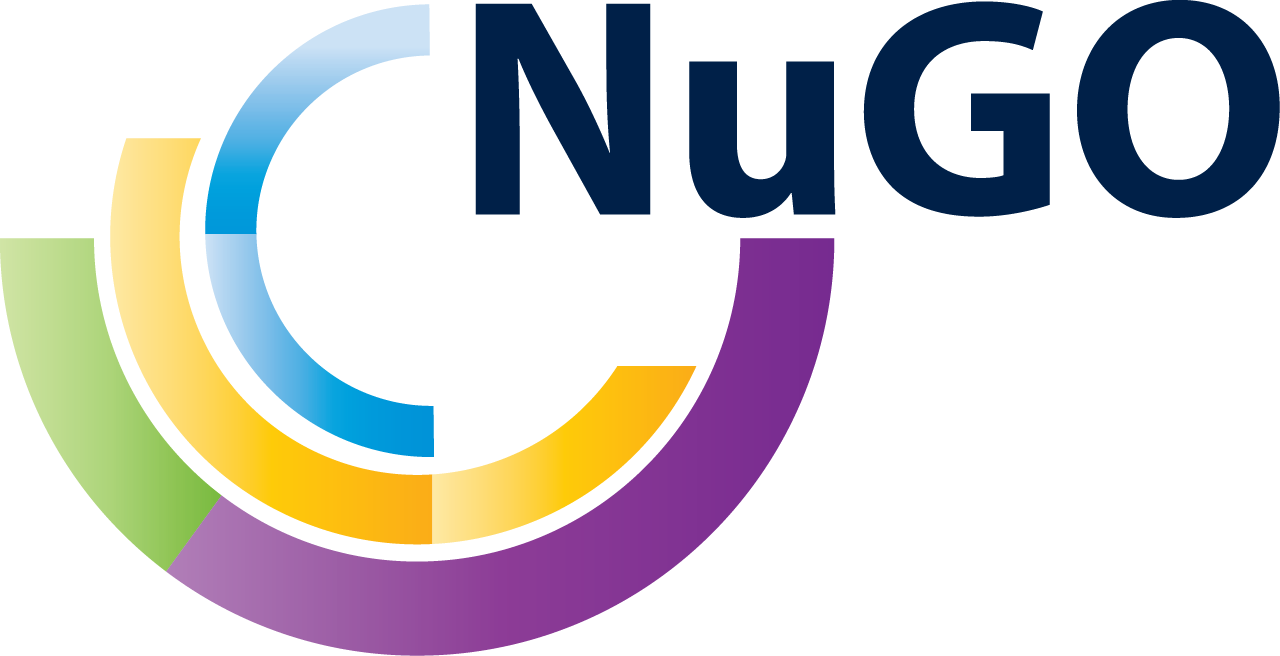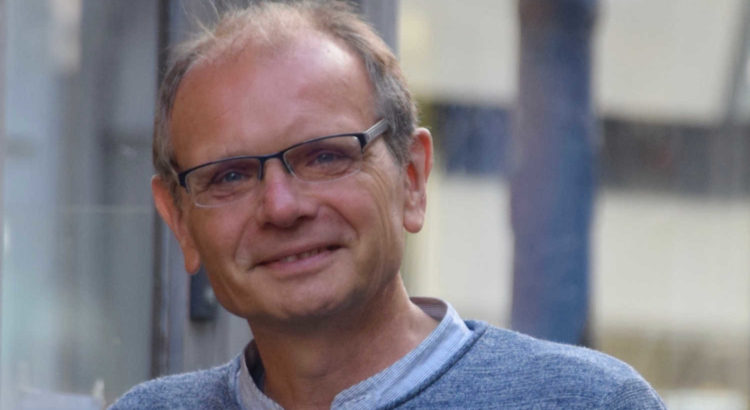WELCOME2
The Institute’s new research project will be headed by Prof. Carsten Carlberg, a prominent biochemist, and vitamin D specialist. It will aim to create a Centre of Excellence dedicated to nutrigenomics and help in the fight against diet-related diseases. Prof. Carlberg was officially introduced to the media and people from the local scientific and business community on March 23 at the Olsztyn Science and Technology Park campus.
Prof. Carsten Carlberg was selected as ERA Chair holder under the WELCOME grant, winning an international competition in which candidates were evaluated by renowned scientists from Poland, France, Germany, and Greece.
„Our quality of life is determined by two components: 20% by genes that we have received from our parents and with which we can do little, and up to 80% by epigenetic factors that we can influence. The quality of our lives depends on us alone” – says Professor Carlberg in the opening lecture.
Professor Carlberg gave his lecture before distinguished guests gathered in the Olsztyn Science and Technology Park, which included representatives of the world of science, business, local doctors, management staff of the institutions supporting the development of innovation in the region, representatives of student organizations, associations working to improve the quality of human life, social activists, employees of the Institute of Animal Reproduction and Food Research of the Polish Academy of Sciences, as well as the media. The welcome conference was honored by the presence of Gustaw Marek Brzezin, Marshal of the Warmińsko-Mazurskie Voivodship. Other guests included: Kazimierz Kujawa, Chairman of the Board of MASPEX Group; Prof. Andrzej Babuchowski, President of the Institute of Innovation of the Dairy Industry SM Mlekpol; Prof. Sergiusz Nawrocki, medical oncologist, Vice-Rector for Collegium Medicum UWM; Prof. Małgorzata Darewicz, Dean of the Faculty of Food Sciences UWM; Maria Borzym, Director of Olsztyn Science and Technology Park; Anna Sliwinska, President of the Polish Association of Diabetes Mellitus and others.
New perspectives
The conference was opened by Prof. Mariusz Piskuła, who presented the importance of the WELCOME2 project for the whole region. He also stressed that the choice of Prof. Carsten Carlberg for the position of ERA Chair was not accidental – there was a tough competition. Out of 13 candidates, it was Prof. Carlberg who presented the vision that best fit the impacts we want to achieve.
„The dimension of this project is at least regional. We do not want to build a strong position of the Institute, but to share our achievements with everyone in the immediate vicinity. We want to emanate and transfer our experiences for the development of the region, science in Olsztyn, breaking with the stereotype of Olsztyn as a city in the east, outside the center of important scientific events that take place in Poland” – said Prof. Mariusz Piskuła.
After the speech of Prof. Piskuła, the floor was taken by Gustaw Marek Brzezin, Marshal of the Warmińsko-Mazurskie Voivodship, who noted that ERA Chair WELCOME2 is an extremely important project for him, not only for the sake of the function he holds, but also for personal reasons.
„It is a great honor for me, because I treat it personally, but also as a representative of the local government, to be on this beautiful journey to a better future of the region of Warmia and Mazury. The honor is even greater because we see how much potential we can derive from the world of science, local government, and practice to change the region and stereotypes. The Warmia and Mazury region can implement EU policy as the 21st-century demands” – said Gustaw Marek Brzezin.
When Prof. Carlberg began his lecture, he immediately outlined his goals in creating the Center of Excellence in nutrigenomics at the Institute. Prof. Carlberg will continue his ongoing work of more than 30 years related to vitamin D. Some time ago, he discovered that people can be classified into three groups: high, mid and low responders to vitamin D exposure. That’s why each of us needs a slightly different, strictly personalized dose – there’s no such thing as a „gold standard” in this case.
„Each of us has different needs, different predispositions. Vitamin D supplementation for everyone should look a little different. With specialized testing, we can find out what dose is right for us. If we don’t want to do this, I recommend taking a low dose of vitamin D, which according to my research is five times more than the pharmacists suggest anyway. We will not harm ourselves with this, and we will meet our body’s need for this compound” – said Prof. Carlberg.
The audience enthusiastically reacted to ERA Chair WELCOME2’s presentation, provoking interesting questions. Prof. Babuchowski asked whether vitamin D can be overdosed? In turn, Prof. Sergiusz Nawrocki raised the issue of vitamin D supplementation in Finland, where Prof. Carlberg had previously worked. Guests were also interested in why some people respond well to vitamin D supplementation, while others do not. Prof. Carlberg tried to dispel all doubts of the attendees comprehensively.
Everyone will have their own „digital twin”
One of the most important goals of the Centre’s work will be to develop the so-called „digital twins”, i.e. virtual models of real people, on whom interventions related to the selection of diet, physical activity, and medication will be „tested”. This will be one of the elements of personalized medicine, which is considered to be the future of medical care. Due to the need for numerous computer simulations, Prof. Carlberg is looking for biologists and physicians, and computer scientists to join his team.
„A hundred years ago, people were making prototypes of airplanes, but they were operating somewhat blindly. Some of them flew, some of them went down right after takeoff. By trial and error, they finally figured out what an airplane should look like, and that’s how it is today. Today such actions are unthinkable. Now engineers digitally create every part of an airplane before they manufacture it. The digital twin is intended to serve the same function – a virtual model for testing diets and drugs” – explained Prof. Carlberg.
Prof. Carlberg’s welcome conference is only the first chord of his work in Olsztyn. The best – from a scientific point of view – is yet to come.
ERA Chair WELCOME2
The European ERA Chairs H2020 grant worth EUR 2.5 million, entitled „Establishment of a Centre of Excellence in Olsztyn. „Establishment of a Centre of Excellence in the area of nutrigenomics for improved health and quality of life” (WELCOME2) was awarded to the Institute of Animal Reproduction and Food Research of the Polish Academy of Sciences in 2020. The Institute is one of seven ERA Chairs laureates in Poland in the program’s history to date. Its realization will allow the creation in the Institute an international research team led by world-class scientists and to carry out structural changes leading to ensure that the Institute’s research conditions meet the standards of the European Research Area.
More about the ERA Chair WELCOME2 project at: https://welcome2.pan.olsztyn.pl/
Melo Radio
Marshall of Warmia and Mazury Gustaw Marek Brzezin
Prof. Monika Kaczmarek

